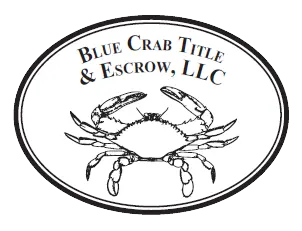T 301-862-5417 | F 301-862-3789 | E info@bluecrabtitle.com
What is title insurance?
Title insurance protects your ownership rights to a property against any claims that other people may have on your property. Even if your deed is fully executed and recorded at the courthouse, it does not necessarily cancel any prior rights on the property that could go back years.
An owner’s insurance policy guarantees that the property that you are purchasing has no hidden defects in the title, such as undisclosed liens, forgeries, or human error by title professionals who researched the property. You’ll pay it one time at closing and it will protect you as long as you own the home, saving you time and legal fees if you ever do need to defend your rights to your property.
What risks does it protect you against?
- Forged deeds, mortgage, satisfactions, or releases
- Deed by a minor or person who is mentally incompetent
- Deed executed under falsified or expired power of attorney
- Deed from corporation, unauthorized by corporate by-laws or resolution
- Deed from partnership, unauthorized under partnership agreement
- Deed recorded, but not property indexed in the public records
- Deed challenged as being given under fraud, undue influence, or duress
- Claims resulting from use of ‘alias’ or fictitious name by a predecessor in title
- Undisclosed but recorded federal or state tax lien
- Undisclosed but recorded judgment or spousal/child support lien
- Undisclosed but recorded prior mortgage
- Undisclosed but recorded notice of pending lawsuit affecting land
- Undisclosed but recorded easements (for access, utilities, drainage, airspace, views) benefiting neighboring land
- Undisclosed but recorded covenants or restrictions, with (or without) rights of reverted
- Undisclosed but recorded boundary, party wall, or setback agreements
- Errors in tax record (mailing tax bill to wrong party resulting in tax sale, or crediting payment to wrong property)
- Misinterpretation of wills, deeds, and other instruments
- Erroneous or inadequate legal descriptions
- Deed to land without a right of access to a public street or road
- Deed to land with legal access subject to undisclosed but recorded conditions or restrictions
- Forged notarization or witness acknowledgment
Deed not properly recorded (wrong county, missing pages or other contents, or without required payment)
Deed from grantor who is claimed to have acquired title through fraud upon creditors of a prior owner.
What does a title company do for me?
Title companies take care of the following services before you arrive at the settlement table:
- Ordering title abstract and property survey
- Examining the title to assess “marketability and insurability”
- Contacting all parties to schedule settlement
- Preparing necessary closing documents
- Contacting the seller’s lender to pay off any loans or liens on the property
- Preparing the title insurance binder for your lender
- Verifying property taxes with the local tax authority
- Verifying dues with your homeowner’s association (if applicable)
- Prorating items between you and the seller, such as property taxes and homeowner’s association dues
- Preparing the HUD-1 or Settlement Statement
What additional coverage can I get?
- Preexisting violation of subdivision mapping laws
- Preexisting violation of conditions, covenants, and restrictions affecting the land
- Preexisting violation of conditions, covenants, and restrictions affecting the land
- Deed to land with improvements encroaching upon land of another
- Incorrect survey (misstating location, dimensions, area easements, or improvements upon land)
- Forgery after the date of policy
- Federal estate or state inheritance tax liens (may attach without recorded notice)
- Physical location of easement (underground pipe or sewer line) which does not conform with easement or record
What do I bring to settlement?
Certified funds and checkbook- because sometimes we do not receive all necessary documentation until moments before the settlement meeting, we cannot guarantee an exact dollar amount ahead of time. We suggest that you bring certified funds in the amount that was provided in the estimate given to you by your lender. Any additional funds can be paid at the settlement table with a check and any overpayments will be refunded to you.
Photo Identification – Bring a government-issued form of photo identification. Some lenders may require a secondary form as well.
Lender Conditions – Bring your homeowner’s policy evidence of coverage and paid receipt to settlement. Your lender may also require you to bring additional items such as termite, well or septic reports, gift funds letter, letter of explanation, etc. in order to satisfy the conditions of your loan. Please be sure to bring originals or copies of these items if you do not have the originals.
